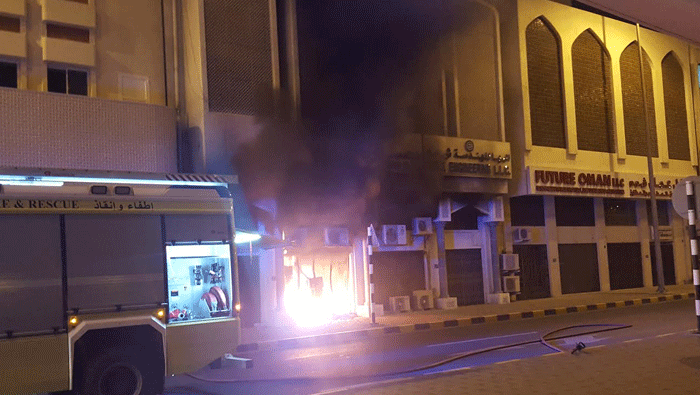
Muscat: In light of the recent fire incident that happened in one of the residential blocks in the CBD area of Ruwi, residents are now concerned about their safety, especially in buildings that also have offices.
Read here: Fire at apartment building in Oman
The fire that took place in Ruwi last week had started in the basement of a building, which houses a printing press and an AC installation and electrical repair shop. However, only the latter was affected. When the Times of Oman spoke to a couple of residents from that building and surrounding apartment blocks, they seemed concerned.
Read also: Seven saved in Oman fire rescue
“No such incident happened here before and so we never thought about such a thing, but now that this unfortunate thing has occurred, we are a little concerned. Not like this was never expected, but the area is nice and safe and we are glad that nothing major happened here,” said a resident. Fayaz, another resident from a building next to the one which was affected, said it was scary because if the fire spread, anything could have happened. “Most of the apartments here have offices in them and that is usually not a cause of concern, but I think that places, such as printing presses and technical shops need to be more secure about safety regulations.”
A supervisor at the shop, which was affected, said the fire was thought to have occurred because of a short circuit. “I think it was because of a short circuit; we are still investigating, but it’s a little puzzling because we turn everything off before we leave the office and normally we are not even in the office, we work outside most of the time.
“At the time when the fire started, it was past midnight and no one was in the office, we normally switch off our main gear and all the power is supposed to be off after that, so we are just wondering what might have gone wrong.”
An administration department official from a company in Ruwi said they need to get their office license approved every year and a major part of the renewal is inspection of the fire safety services. “The Royal Oman Police calls us and fixes appointments annually when it comes to the renewal of licenses. They check the smoke detectors, water pumps, the number of fire extinguishers, and the exit plan. We are usually advised to have one fire extinguisher in every room of the office.”
Huda, an administrative personnel working at a private company in CBD, said, “We have been advised by ROP to ensure that we have fire extinguishers in place and have a proper emergency exit and fire safety plan, together with smoke detectors.”
Joel Jacob, a Health, Safety and Environment (HSE) instructor for Special Technical Services (STS) has listed safety regulations for offices and homes. “Fire is a common incident in Oman in houses, as well as offices. It is something that humans can’t control if not detected.
There are small fires, which we can be extinguished with fire extinguishers, but there are ones which if not contained can be catastrophic for small houses, businesses, which in turn result in a huge loss of lives or assets.”
“If you are a trained personnel, only then can you use the fire extinguisher, otherwise leave it to professionals, or contact the Oman Fire Department at 9999.”
These are some of the major causes for fire in many places around the world:
• Arson
• Incorrect use of flammable materials
• Faulty, overloaded or misused electrical equipment
• Incorrect tools used in intrinsically safe zones
• Sparks, heat or friction from hot work
• Unsafe storage of materials
• Smoking in unauthorised areas
• LPG gas cylinder kept open after cooking can increase risk of gas release and explosions in houses.
One can prevent such fires by always remembering, “Prevention is better than cure.”
Preventing electrical fires
• Proper electrical design
• Regular maintenance of wiring and equipment
• Unplugging all equipment when it is not in use
• Training staff on how to avoid overloading systems
• Training staff on how to position hot equipment away from sources of ignition
• Control over use of electrical equipment and ignition sources
• Good office cable management
• Avoiding the use of toasters, portable fans and heaters
• Overloading electrical sockets should be completely avoided
• Do not keep mobile devices like cell phone and battery packed equipment for a long time
• Make sure you switch off equipment if not in use
What sort should you look out for?
• Are fire extinguishers where they should be and are they still in test date?
• Has there been a fire drill in the last six months, and if not ask to organize one
• Are all fire doors kept closed at all times?
• Are emergency exit routes and doors kept free of obstructions?
• Are emergency lighting indicator lights showing whether they are all functioning?
• Are all fire signages still in place?
• Are keys to external fire exits where they should be?
• Ask people in the office if they know the fire rules and educate them if they do not.
• Is there any unauthorised electrical equipment, which has been brought into the site or office?
• Are electrical sockets all being used correctly so as not to overload them?
• Have visitors been inducted in the fire procedures?
• There is a back up fire warden around for when you are not there.
How to minimise the risk of spreading fire